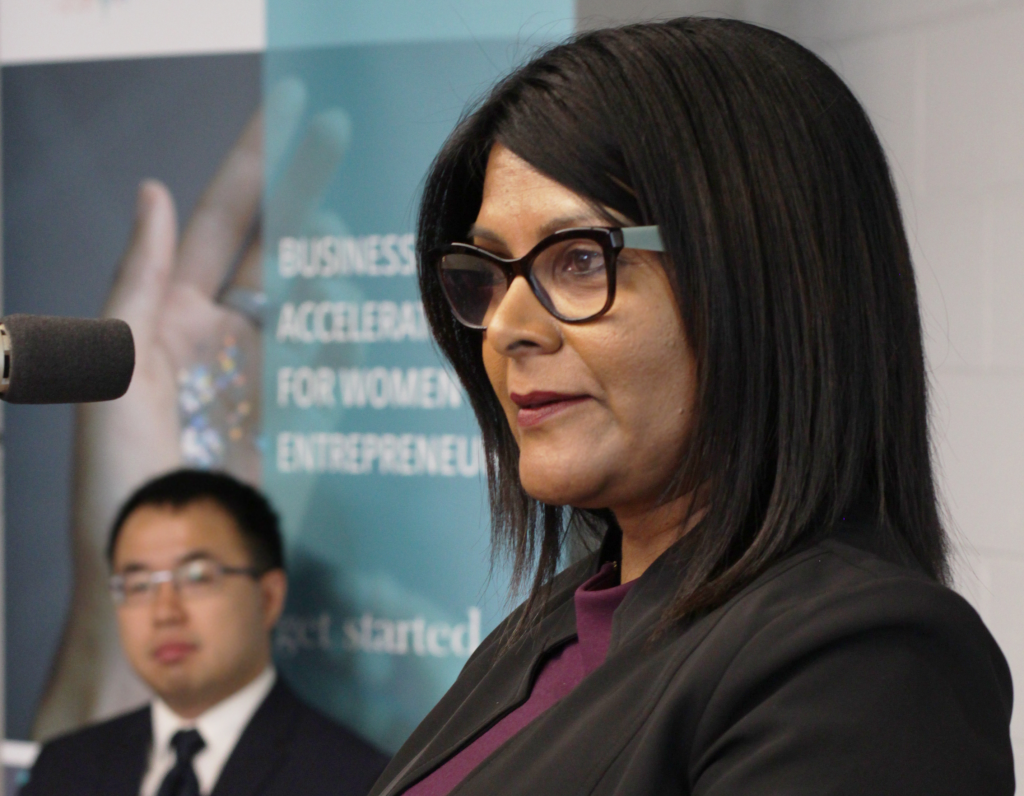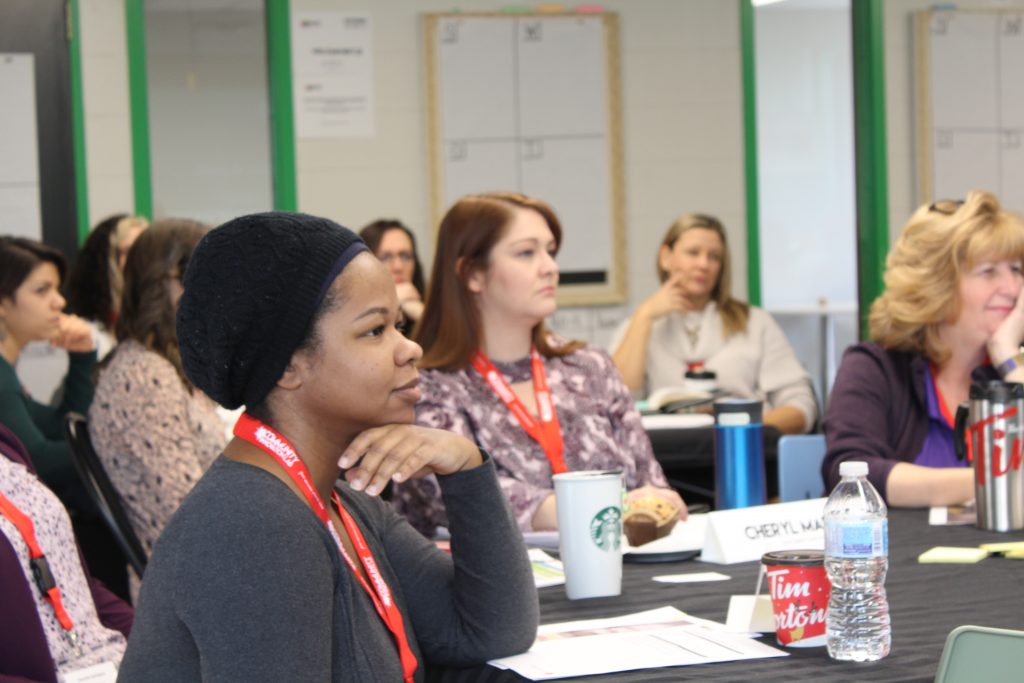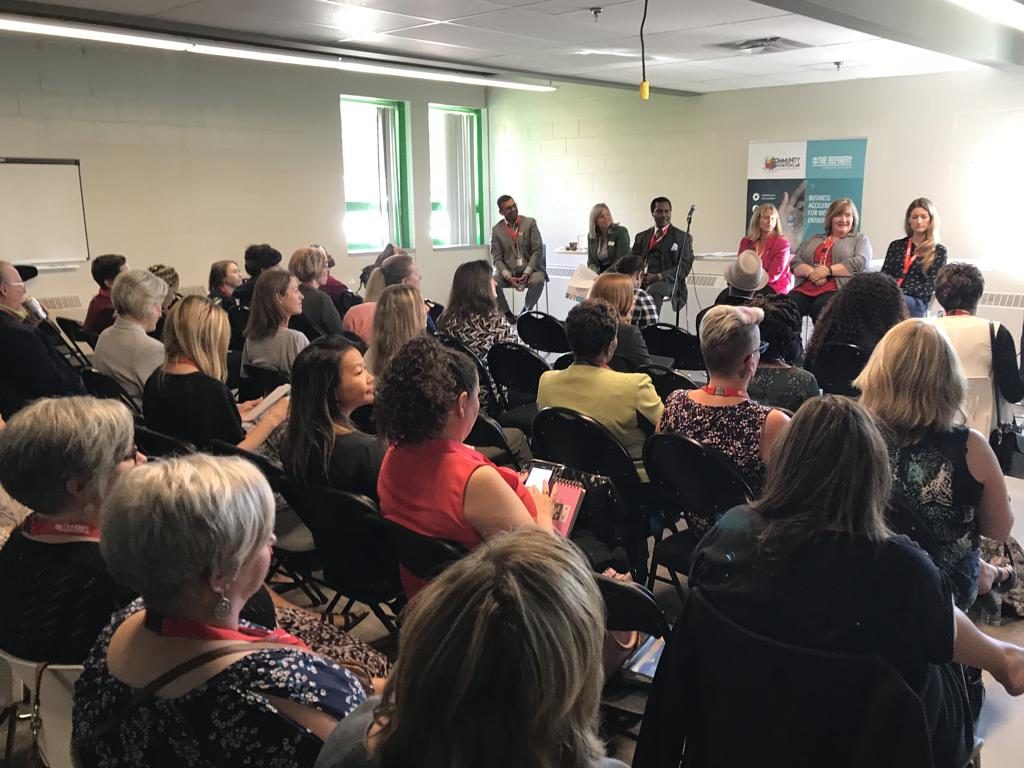The post Risky Business? Maybe Not appeared first on LiisBeth.
]]>

“You are risk takers, don’t listen to that stuff. You are risk takers because, quite frankly, you raise families, you have children, you move countries, you move cities, you have had enormous risk in your life!”
That message from Women on the Move’s CEO Heather Gamble—to ignore such axioms as “women can’t succeed in business because they don’t take risks”—had particular resonance for this audience of women business founders, some of whom had endured extreme risk, such as immigrating to Canada, heading single households, and surviving intimate partner violence. And the point was particularly impactful coming from an entrepreneur who reached $1 million in revenue just 18 months after launching her first startup.
As a revenue accelerator devoted to helping other women entrepreneurs reach the million-dollar milestone, Gamble is also a faculty mentor of The Refinery, a unique business growth program designed by women for women out of the Community Innovation Lab (iLab), a hub for entrepreneurs based one hour east of Toronto in Oshawa, Ont., where it serves the Durham Region.
Pramilla Ramdahani started the non-profit iLab as a way to tackle community social issues through an innovative lens in an ethnically diverse region with pockets hard-hit by job losses. Ramdahani, who has an MBA in community economic development and studied social entrepreneurship at Stanford University, left her own successful enterprise and bootstrapped iLab for three years before landing any kind of substantial funding. Talk about taking a risk. Eventually, the Ontario Trillium Foundation funded iLab’s most in-demand seminar, which morphed into The Refinery and will support 1,335 women through 2020.
Ramdahani says she started The Refinery after noticing two needs in the region: entrepreneurial training for women and assistance for marginalized women. After seeking feedback from the community through roundtable events, Ramdahani realized that women wanted a founder’s program created and staffed by women, to serve women. Women said they felt safer in smaller rooms with doors rather than one large open hall. They also said they have different and more open conversations when the instructors are female. Plus, they like to support each other. According to Brenna Ireland, director of operations for iLab, the women wanted a program to strengthen “business and personal ties to better the community, not just compete against each other.”
So, no, a traditional male-led accelerator would not do.
Yet, The Refinery is more than an all-female accelerator
At the earliest stages, LiisBeth founder Petra Kassun-Mutch designed a curriculum for women-only programs that helped infuse feminist entrepreneurial values throughout iLab’s work—business counselling and training, building opportunities and networks, mentoring, and widening access to capital. (Researchers Barbara Orser and Catherine Elliott define feminist entrepreneurship as “a mechanism to create economic self-sufficiency and equity-based outcomes for women, girls, and other gender-oppressed communities.”) All entrepreneurs at iLab are coached with the end goal of achieving autonomy, and by extension, strengthening their community with hiring and spin-off economic activity from new ventures.

The Refinery includes a three-day boot camp, a year of intensive training delivered online and at the iLab centre, optional seminars on such topics as social media marketing, and opportunities to receive year-long mentoring from an established entrepreneur. Women learn how to access capital, build strong teams, scale processes, and generate sales.
The Refinery supports entrepreneurs working in a variety of sectors including business services, media, wellness and coaching, automotive sector, food, gift products, and human resources (note it’s not just tech). Women are guided to discover their own strengths and ideas, rather than the staff deciding which businesses would be best for them. According to Ramdahani, The Refinery is about “integrating empathy, social justice, and user-led techniques.”
The women-centric support and camaraderie is particularly important for abuse survivors, who face additional challenges when starting a business. According to the Institute for Women’s Policy Research in the U.S., survivors may have endured years of economic abuse, including tactics that damage their credit, deplete their resources, and prevent them from completing education and training. They may face ongoing threats of violence even after leaving an abuser, as well as legal issues and long-term mental and physical effects of trauma. Survivors may also have spotty employment records. Child care is often difficult to arrange after years of social isolation. And while all entrepreneurs may struggle with confidence, survivors must overcome low self-esteem brought on by years of abuse. They may also fear publicity or the idea of bringing their business online given that abusers often continue stalking and harassing their victims, in person and online. To top it off, survivors likely live under the poverty line and struggle to pay for food, shelter, utilities, and transportation expenses, leaving little to bootstrap a new business.
But the same policy research group also notes that survivors have strengths and resilience that may serve them well in entrepreneurship. The reality of managing a relationship with an abusive partner may require the same skills exhibited by the most successful CEOs: calculated risk-taking, thoughtful action, tough-mindedness, the ability to read people, problem solving, and determination.
In Oshawa, where iLab is based, domestic violence calls to police increased by 15 percent between 2013 and 2017, but the actual rate is much higher, as 70 percent of spousal violence is not reported to the police, according to the Canadian Women’s Foundation.
One survivor in The Refinery program (she asked to remain anonymous), who started a new business service while caring for elderly relatives, says she still suffers side effects from an earlier abusive relationship and has been grappling with relocation. She received much-needed sales, marketing, and financial training from The Refinery, but it was the all-female setting that was most critical. “It provides a safe spot,” she said. “Because after you’ve been victimized, you’re vulnerable and your confidence is shot. And so, any time a man is in the room, it’s a different dynamic than when you’re surrounded by women.”
She recommends The Refinery to “anybody that is looking to flesh out their business, anybody looking to ramp up their business, and who needs to build up a network of people. It certainly gives you all the supports that you need.”
The Refinery and iLab strive to create a safe space for all by requiring instructors to undergo police checks, as well as privacy and sensitivity training. The board of directors and staff strive to be as diverse as those they serve.
And here’s another appealing aspect for marginalized women: thanks to funding from Trillium, all fees are waived. Even optional seminars can be subsidized for those who need financial assistance. To help fund their startups, iLab partnered with the Business Development Bank of Canada (BDC) to widen the eligibility criteria for funding to help women entrepreneurs. Ramdahani also hopes to start a micro-lending circle at iLab to help women who don’t qualify for funding through banks, the BDC partnership, venture capitalists, or angel funding.
A safe space for women nurtures growth for all
Based on the success of The Refinery, iLab looked at other gaps in community services and launched entrepreneurial programming for additional under-represented groups. ILab started incubators for at-risk youth entrepreneurs called NEET (not in education, employment or training), Spice (seniorpreneurs who are 55 and up), and the Social Enterprises Accelerator that helps social entrepreneurs grow to the next level. Said Ramdahani, “If you cannot find employment, why not create your own business? That’s the pathway we see that participants can use to alleviate poverty.”

ILab also offers co-working spaces and rooms to rent for events and meetings—at a fraction of typical costs. Staff are quick to answer questions and find extra resources to accommodate attendees’ personal circumstances. And in order to create a community for entrepreneurs to grow and apply what they’ve learned, alumni from all streams are invited to join a Facebook group once they complete a program.
Elsii Faria, of The Hive Centre Bee and Bee, entered iLab’s social entrepreneur program to get much-needed support in a variety of areas. The business she runs with her husband offers overnight accommodation via a retreat centre that hosts nature, creativity, wellness, and spiritual events, as well as marketing and web design, and a platform called 1Community1 focused on community engagement. While building the business, Faria faced a life-threatening illness, took on a new mortgage for the bed and breakfast and office space, as well as cared for her one-year-old child. Faria says connecting with other social entrepreneurs at iLab gave her “really valuable support from other businesses with similar objectives.” It also introduced her to key partners such as Bear Standing Tall, their first Indigenous retreat leader. She had an arts education but needed to build up business skills. ILab helped her improve her sales skills and understand their business model. The business recently landed a grant that allows them to partner with Durham College to continue developing their 1Community1 platform.
Yet, for all of iLab’s success helping others, it has yet to receive solid funding support from any level of government—municipal, provincial or federal. Ramdahani is frustrated that governments favour investing in tech-based entrepreneurs and large urban-based non-profits. She is pleased that the Ontario Inclusive Innovation Action Strategy, released in June 2019, expands the government’s innovation definition to include “processes that are not tech-based.” But she points out that the strategy will only support women entrepreneurs at the high-growth stage only. “There is no funding for women who are marginalized, and who have just started a business, or have been in business for under three years,” Ramdahani said. Early-stage women founders often find doors for traditional loans closed. Without investment and cash flow to conduct business, Ramdahani wonders, How can they grow?
What funding is available for women entrepreneurs?
The federal government’s Women Entrepreneurship Strategy (WES) has added millions to support women, including new funding for enterprises in the high-growth stage, organizations that help grow women’s businesses, and research hubs. Currently, there is a federally funded women’s business development centre in every province and territory except the Northwest Territories. Provincially, the non-profit Paro Centre for Women’s Enterprise supports women-owned businesses and community economic development in northern, eastern, and central Ontario, excluding the Greater Toronto Area, through federal and Ontario Trillium Foundation funding.
In the U.S., the Small Business Administration (SBA) partners with non-profit organizations to fund and oversee 113 Women’s Business Centres. The centres offer entrepreneurs and small business owners free counselling and free-to-low-cost training. Men can receive services through these centres as well.
American women entrepreneurs are encouraged to register with the SBA for a Women-Owned Small Business or Economically Disadvantaged Women-Owned Small Business Certificate. This qualifies them to bid on contracts with the federal government to supply products and services. During 2017, $20.8 billion in contracts were won by women-owned small businesses. The U.S. federal government strives to award five percent of their supplier contracts to women-owned small businesses.
Like iLab’s innovative programming, these are ideas we can build on. ILab involves participants in curriculum and space design, “rather than building something and inviting them,” said Ramdahani.
Something for funders to chew on.
Did you enjoy this article? Learn something of value? We are a 100% reader-supported media enterprise.And the ONLY feminist media outlet to focus on entrepreneurship and innovation. Please consider supporting us with a monthly donation so we continue to support entrepreneurial feminists and share their stories, critiques and experiences. [direct-stripe value=”ds1554685140411″]. You can also contribute a one time donation by going here: https://www.liisbeth.com/support-the-mission/

This article was generously sponsored by Startup Here Toronto.
Related Stories
https://www.liisbeth.com/2019/06/25/gaslighting-the-silent-killer-of-womens-startups/
https://www.liisbeth.com/2018/08/07/start-up-incubators-are-failing-women-entrepreneurs-so-lets-fix-it/
The post Risky Business? Maybe Not appeared first on LiisBeth.
]]>The post The Cure for the Start-Up Incubator and Accelerator Gender Gap: Accountability appeared first on LiisBeth.
]]>
Think of this as a local case study with global application.
I decided to check out the new website of DMZ, Ryerson University’s award-winning Campus-Led Accelerator, after reading about its latest business development hire. I was particularly interested in what it had to say about its commitment to gender diversity. While its gender performance figures are not publicly published, insiders know that they need improvement.
I was hopeful that the new site might convey a pledge to improve its record on gender equity. But from my perspective, the only reference it made was in a statement under the values* section, and it was deflating and disappointing. They might as well have just written #AllLivesMatter, since the diversity aspirations noted are so broadly inclusive to the point of being meaningless. Gender equity** that’s inclusive of women, trans and gender-nonconforming people affects more than 55 per cent of Ryerson’s student body, and more than 51 per cent of society. But it is not even specifically mentioned. There could be a number of reasons for this, but based on surprising oversights this past year—e.g., the missed opportunity to ensure the new advisory council met or exceeded Premier Kathleen Wynne’s 30 per cent threshold, and an official press release that followed with a Globe and Mail article quoting and celebrating four men and no women—I am going to have to go with the rationale that the leadership is unobservant when it comes to the gravity of this issue for a high-profile organization like theirs.
Make no mistake, I have been a fan of the DMZ and Ryerson’s various additional zones. My enterprise is a member at one of them. But as an advocate for women entrepreneurs, I can’t help but call out weak performance and miss the chance to spotlight the huge and wasted opportunity for the number-one university-based incubator in North America (according to UBI Global*** rankings) to take a leadership position on gender equity.
And it’s not just about representation. It’s also about culture. Take it from those who have been there, you can’t thrive or flourish as a marginalized entrepreneur in environments that lack inclusive language, behaviours, and organizational and program design.
In 2015, Canadian securities regulators required public companies to report on gender equality. In 2016, Premier Wynne set diversity targets for the public sector to lead by example. The big four consulting firms publish report after report citing the business case for gender diversity. There is corporate Canada’s 30% Club. The UN Millennium Development lists gender equality as goal number three. And in January, millions of women marched in the streets around the world. Times are changing.
Yet the province’s Campus-Led Accelerators (CLAs) and Regional Innovation Centres (RICs, including MaRS) are still not required or mandated to report publicly, or consistently, on gender equity and equality to those who fund them, the Ontario government and taxpayers. There is no gender lens performance scorecard for an important economic development initiative that affects the majority of our population and that costs the province tens of millions of dollars.
Why We Need a Benchmark Report and Public Accountability
The CLAs and RICs are the backbone of Ontario’s innovation and economic renewal strategy. They are managed by smart people and smart money, but still seem to have so much difficulty moving the needle on a variety of gender diversity metrics including the percentage of female founders with majority share, investment dollars raised by gender and category of investors, achieving gender equity on advisory boards (e.g., DMZ’s newly appointed advisory council has 18 members and only four are women), or finding ways to improve on satisfaction with survey feedback from female participants, which should be done via a third party to ensure feedback is authentic and given without fear of reprisal.
It’s not that they don’t try. Sort of. For example, there has been a lot of talk about the issue at conferences. And it’s not uncommon to see them deal with the veneer of the issue, like updating marketing materials to ensure images are gender balanced, or sponsoring women-led initiatives (e.g., DMZ’s sponsorship of Moving The Dial, an event for women to network with tech leaders).
While good, we know these efforts just scratch the surface. For example, some tech incubators launch female founder programs, but are surprised when they have trouble recruiting. If they had dug deeper, they’d be able to go beyond blaming the pipeline and uncover their fear that investors will not treat women founders in women’s programs seriously. Gender issues are embedded in our society, not just in incubators. And they are complex.
Making progress is therefore bound to be slow. But the creation of a publicly available gender scorecard for Ontario’s CLAs and RICs will, in my opinion, serve as an accelerant.
It’s Time to Call for Gender Equity Accountability in the Incubator and Accelerator Space, starting with the DMZ
The DMZ is considered to be one of the top startup incubators in the world. It represents Canada, a country where even our prime minister calls himself a feminist without reserve. And it is hosted by Ryerson University, a research institution that has the internal expertise to initiate a gender benchmark study in accordance with global best practices. Therefore, it is a good place to start.
Innovation and entrepreneurship matters to all of us. We, at present in Ontario, are failing an entire gender in this space—this is the only province in Canada without a women’s entrepreneurship strategy. We need to do better.
We suspect this is also the case elsewhere.
How to Move the Needle?
We can start by requesting the creation of a public gender equity scorecard for the accelerator and incubators globally.
In the specific case of the DMZ and Ontario’s innovation ecosystem. Email your concerns to Ryerson University President Mohamed Lachemi at [email protected], Premier Kathleen Wynne through this form, and the Minister of Economic Development and Growth Brad Duguid at [email protected], which is responsible for Ontario’s CLAs and the Ontario Network of Entrepreneurs (ONE).
We can also take the time to learn about best practices ourselves. I recommend reviewing this recently released B Corp guide on steps to inclusion.
* DMZ Values Statement (as of Feb. 18, 2017): “We believe that diversity—of people, of opinions, of ideas, of industries and of approaches—is essential to doing good business. To encourage and celebrate diversity, we seek to provide equal opportunities for everyone to participate in DMZ programming, events and everyday culture. The DMZ community fosters a sense of belonging, respect, and support. This provides a framework that empowers everyone to achieve their best.”
** Equality vs. Equity: “Equity and equality are two strategies we can use in an effort to produce fairness. Equity is giving everyone what they need to be successful. Equality is treating everyone the same. Equality aims to promote fairness, but it can only work if everyone starts from the same place and needs the same help.”
*** UBI Index metrics does not currently consider diversity and inclusion in its evaluation of incubators and accelerators.
Additional Related Reading
https://www.liisbeth.com/2016/06/21/confronting-gender-inequity-inclusion-innovation-space/
The post The Cure for the Start-Up Incubator and Accelerator Gender Gap: Accountability appeared first on LiisBeth.
]]>The post The Future of Accelerators and Incubators? appeared first on LiisBeth.
]]>O’Sullivan, founder and managing director of SOSV, a large venture fund with its own privately run accelerator program, and who has invested in 400 companies over 20 years, gave a keynote speech at Montreal Startupfest’s Premium AcceleratorFest (held a day before the main festival) on July 13. And while bullish on the importance of entrepreneurs in innovation-dependent economies, he did not think the future was bright for hybrid incubators or accelerators in particular. This was not good news for the attendees—the majority of whom manage or work in these organizations—or for the entrepreneurs who depend on hybrid incubators and accelerators to succeed.
But let’s start at the beginning. In order to understand O’Sullivan’s predictions for the sector, it is important that one knows some basic industry terms.
What Is an Accelerator and Incubator?
While their operational practices (length of program, terms of engagement, level of pressure, sector focus, philosophy) vary, they both aim to improve an entrepreneur’s odds of success by providing programming, mentoring, space, and facilitating access to funding. The main difference between the two is in legal form and who pays their operating costs. Incubators are primarily non-profit organizations (or hosted by them) and are funded publicly or by donations and grants. Accelerators tend to be private, for-profit organizations, often backed by a private equity or venture capital funds.
For-profit accelerators or incubators are in business to make a profit for their shareholders or venture fund partners as quickly as possible. Non-profit equivalents are generally in business to diversify the local economy, provide new opportunities for struggling demographics, build out new industries, and create local jobs. They generally take a longer-term view with a focus on social benefits.
So What Are Hybrids?
The hybrids are a combination of incubator and accelerator. They are funded by public money and donations, and are charged with the mission to achieve economic development and social goals for their area. However, they’re increasingly expected to reduce their dependence on public money (and the uncertainty that comes with that) by also aiming to make a profit on the companies they incubate. Many university incubators serve as examples.
And therein lies the rub. Hybrids essentially have two masters and dual missions: serve the public policy agenda, and make money while doing it. In O’Sullivan’s view, it’s like trying to mix oil and water. You can be one or the other, but not both. “Trying to combine social goals with profit-making is very unlikely to succeed.”
O’Sullivan also suggested there was an oversupply of incubators and accelerators generating increasingly mediocre results. High potential startups will gravitate to the best, or not bother with incubators or accelerators at all (like entrepreneurs used to do before they came along) because they will be perceived as either a waste of time or money, or both. This will result in a much needed shake out. “And that’s okay,” said O’Sullivan.
Many in the audience nodded in agreement with the prediction that hybrids are likely the first to go. Those that don’t close down entirely will most likely be absorbed by their institutional or corporate hosts and be re-configured (for example, marginal university incubator programs will be reclaimed by academic councils).
In O’Sullivan’s view, ultimately, only venture-capital-backed programs will be left standing.
But as we consider this prediction, we also need to remember that this “who will survive” divination is coming from the perspective of venture fund managers and venture capitalists like O’Sullivan. Making money for shareholders or partners is what they are paid to do. For them, doing anything else would just amount to a mandate to fail.
For more reading on accelerators and incubators, visit International Business Innovation Association or Canadian Acceleration and Business Incubation.
The post The Future of Accelerators and Incubators? appeared first on LiisBeth.
]]>